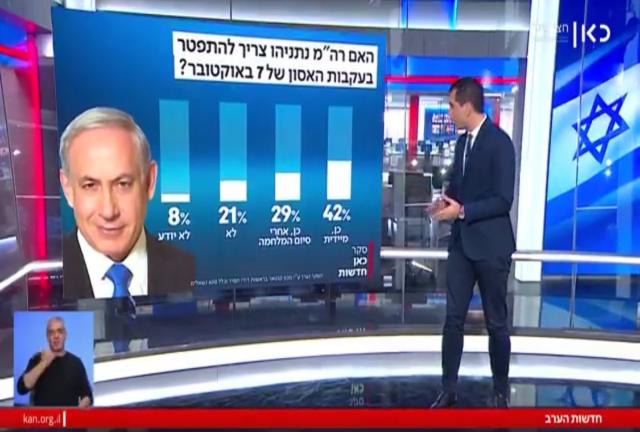Recent surveys reveal a significant dissatisfaction among the Israeli public with Prime Minister Benjamin Netanyahu's administration, especially in light of current national challenges. Data from polls conducted by Channel 12 and KAN public broadcasting illustrate a common sentiment: a considerable majority of Israelis, over 70%, advocate for Netanyahu's resignation, either immediately or following the conflict's conclusion. The call for change is underscored by the belief that the current coalition government would not retain its Knesset majority if elections were held today, with around 50% of the population favoring early elections over waiting for the scheduled 2026 ballot.
The backdrop of these opinions is a complex blend of recent events and long-standing issues. The Hamas Oct. 7 massacre, widely regarded as a grave intelligence oversight surpassing even the 1973 Yom Kippur War's failures, has ignited fierce criticism. While certain military and political figures have accepted responsibility, Netanyahu has resisted such moves, pledging a comprehensive review post-conflict. Nonetheless, nearly half of the respondents in the KAN poll see Netanyahu as fundamentally accountable for the inability to prevent these tragic events, placing him above other figures such as IDF Chief of Staff Herzi Halevi and Shin Bet Director Ronen Bar in terms of responsibility.
Netanyahu's motives: Channel 12 poll reveals a deepening divide within the Israeli public regarding Prime Minister Netanyahu's motives, with nearly half of Israelis (49%) suspecting political interests behind his actions.
— Rafi Cohen-Almagor (@almagor35) April 9, 2024
Public sentiment also extends to the handling of the ongoing war, with dissatisfaction evident in various aspects. A substantial portion of Israelis express discontent with the war's direction, despite military successes in Gaza. Critiques focus not just on Netanyahu, with a notable percentage holding him responsible for the war's management, but also on other military leaders. Figures like Halevi face scrutiny, with mixed opinions on their resignation timing but a general trend towards accountability after the war.
Performance ratings during the war reflect these concerns, with Netanyahu, Gallant, and Halevi receiving middling scores in polls, indicating a broad desire for more effective leadership. Political affiliations play a role in these perceptions, with variations in approval ratings among right-leaning and center-left voters. The issue of the hostages remains a particularly sensitive point, with a majority feeling the government's efforts are lacking.
🙏🏽👍🏽Poll: 71% think Netanyahu should resign either immediately or right after war https://t.co/0t1tgMWQqp via @timesofisrael
— SheSternly (@SheSternly) April 10, 2024
Furthermore, a significant portion of the population questions Netanyahu's motivations, with nearly half suspecting political self-interest over practical governance reasons. This skepticism extends to diplomatic relations, with concerns about Netanyahu's role in potential tensions with international allies.
Majority of Israelis believe Netanyahu’s wartime decision-making driven by personal interest: poll https://t.co/xIKh3j920a pic.twitter.com/1G8aKvJnlk
— New York Post (@nypost) January 22, 2024
These polls paint a picture of a nation at a crossroads, grappling with internal and external challenges. The Israeli public's appetite for change, both in leadership and policy direction, reflects deep-seated concerns over governance, security, and international relations. As Israel navigates these turbulent times, the voices calling for accountability and a new path forward resonate more strongly than ever.


